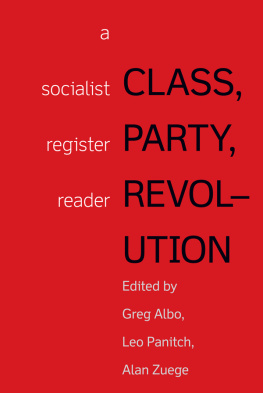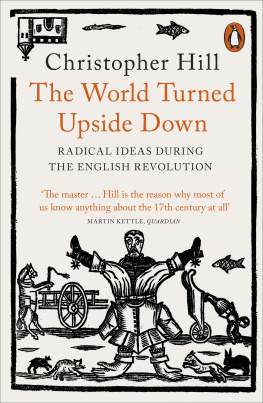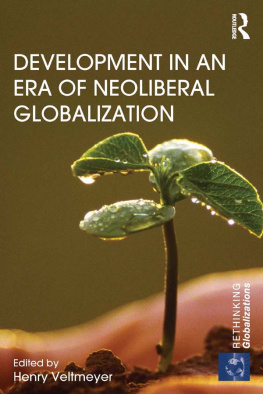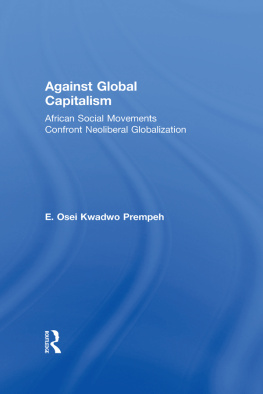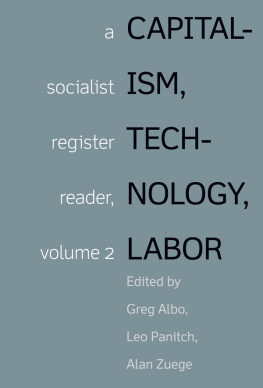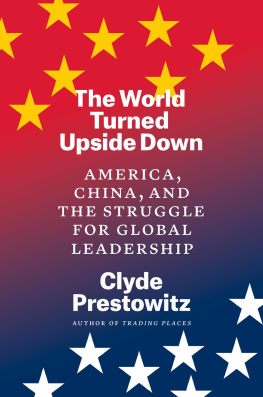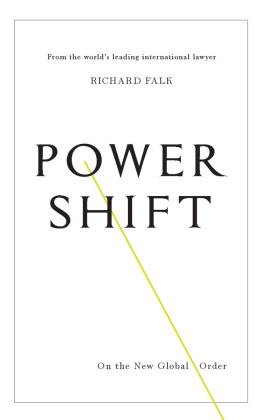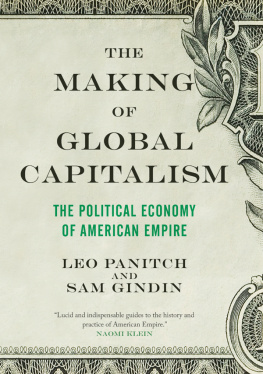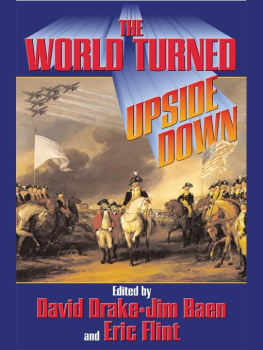
SOCIALIST
REGISTER
2019
THE SOCIALIST REGISTER
Founded in 1964
EDITORS
LEO PANITCH
GREG ALBO
FOUNDING EDITORS
RALPH MILIBAND (1924-1994)
JOHN SAVILLE (1916-2009)
ASSOCIATE EDITORS
COLIN LEYS
ALFREDO SAAD-FILHO
ASSISTANT EDITORS
ALAN ZUEGE
STEPHEN MAHER
CONTRIBUTING EDITORS
GILBERT ACHCAR
AIJAZ AHMAD
NICOLE ASCHOFF
PATRICK BOND
ATILIO BORON
JOHANNA BRENNER
MICHAEL CALDERBANK
VIVEK CHIBBER
GEORGE COMNINEL
MADELEINE DAVIS
BARBARA EPSTEIN
NATALIE FENTON
BILL FLETCHER JR
ANA GARCIA
SAM GINDIN
ADAM HANIEH
BARBARA HARRISS-WHITE
DAVID HARVEY
JUDITH ADLER HELLMAN
CHRISTOPH HERMANN
NANCY HOLMSTROM
URSULA HUWS
RAY KIELY
MARTIJN KONINGS
HANNES LACHER
SASHA LILLEY
LIN CHUN
MICHAEL LOWY
EBNEM OUZ
BRYAN PALMER
ADOLPH REED JR
STEPHANIE ROSS
SHEILA ROWBOTHAM
JOHN S. SAUL
JOAN SANGSTER
MICHALIS SPOURDALAKIS
HILARY WAINWRIGHT
To get online access to all Register volumes visit our website
http://www.socialistregister.com
SOCIALIST
REGISTER
2019
A WORLD TURNED UPSIDE DOWN?
Edited by LEO PANITCH and GREG ALBO
THE MERLIN PRESS
MONTHLY REVIEW PRESS
FERNWOOD PUBLISHING
First published in 2018
by The Merlin Press Ltd.
Central Books Building
Freshwater Road
London
RM8 1RX
www.merlinpress.co.uk
The Merlin Press, 2018
British Library Cataloguing in Publication Data is available from the British Library
ISSN. 0081-0606
Published in the UK by The Merlin Press
ISBN. 978-0-85036-735-5 Paperback
ISBN. 978-0-85036-736-2 Hardback
Published in the USA by Monthly Review Press
ISBN. 978-1-58367-750-6 Paperback
Published in Canada by Fernwood Publishing
ISBN. 978-1-77363-143-1 Paperback
Printed and bound in the UK on behalf of Stanton Book Services
CONTENTS
Leo Panitch
Greg Albo |
Leo Panitch
Sam Gindin |
Aijaz Ahmad |
Adam Hanieh |
Elmar Altvater
Birgit Mahnkopf |
Doug Henwood |
Ray Kiely |
Lin Chun |
Sean Kenji Starrs |
Jayati Ghosh |
Ana Garcia
Patrick Bond |
Marco Boffo
Alfredo Saad-Filho
Ben Fine |
Umat zsu |
David Whyte |
Nicole Aschoff |
Alan Cafruny |
Colin Leys |
CONTRIBUTORS
Aijaz Ahmad is the Chancellors Professor at the Department of Comparative Literature, University of California, Irvine.
Elmar Altvater was professor of Political Science at the Otto-Suhr-Institut of the Free University of Berlin and editor of the journal, Prokla.
Nicole Aschoff holds a PhD in sociology from the Johns Hopkins University. She is author of The New Prophets of Capital and on the editorial boards of the Socialist Register and Jacobin.
Marco Boffo holds a PhD in economics from SOAS, University of London. He has taught the political economy of development at SOAS and worked as a research fellow at the Leeds University Business School.
Patrick Bond is professor of Political Economy at the Wits School of Governance, University of the Witwatersrand, South Africa.
Alan Cafruny is Henry Platt Bristol Professor of International Affairs at Hamilton College in New York state.
Ben Fine is professor of Economics at SOAS, University of London.
Ana Garcia is professor of International Relations at the Federal Rural University of Rio de Janeiro.
Jayati Ghosh is professor of Economics at the Centre for Economic Studies and Planning, Jawaharlal Nehru University, New Delhi.
Sam Gindin is the former research director of the Canadian Auto Workers Union and an adjunct professor at York University, Toronto.
Adam Hanieh is a senior lecturer in Development Studies at the University of Londons School of Oriental and African Studies.
Doug Henwood publishes the Left Business Observer newsletter and hosts Behind the News on KPFA radio. His most recent book is My Turn: Hillary Clinton Targets the Presidency.
Ray Kiely is professor of Politics at Queen Mary University of London.
Colin Leys is co-chair of the Centre for Health and the Public Interest in the UK, and honorary research professor at Goldsmiths, University of London.
Lin Chun is associate professor in Comparative Politics, London School of Economics.
Birgit Mahnkopf is professor of European Social Policy at the Berlin School of Economics and Law.
Umut zsu is assistant professor at the Department of Law and Legal Studies, Carleton University, Ottawa.
Leo Panitch is Senior Scholar and Emeritus Professor of Political Science, York University, Toronto.
Alfredo Saad-Filho is a professor in Development Studies at SOAS, University of London.
Sean Kenji Starrs is assistant professor of International Relations at the City University of Hong Kong.
David Whyte is professor of Socio-Legal Studies at the University of Liverpool.
PREFACE
S ince the Great Financial Crisis swept across the world in 2008, there have been few certainties regarding the trajectory of global capitalism, let alone the politics taking hold in individual states. A decade on, all that may be said to be clear is that the contradictions of neoliberalism have deepened, especially as these have been intertwined with the class inequalities exposed by the crisis and the ever-growing contradictions of global migration and ecological degradation. And this has opened more and more political space for far right forces challenging not so much neoliberalism itself as conventional liberal democratic norms, as well as key pillars of the global capitalist order which had been built up over past the half century.
There was already considerable disorientation abroad in the face of Brexits aggravation of the ongoing crisis of the European Union, wherein anti-globalist right-wing political movements and policy advisors openly proclaim their attraction to the authoritarian bravado of Vladimir Putins strong state. But even this has now given way to palpable confusion regarding what sense to make of this world in a political conjuncture marked by Donald Trumps Make America Great Again presidency of the United States, on the one hand, and, on the other, Xi Jinpings ambitious agenda to consolidate his position as core leader at the top of the Chinese state. Trumps explicit disdain for the modes of leadership the US exhibited in the making of global capitalism since the Second World War including providing the scaffolding for the institutions underpinning integrated global production and trade, financial flows, development support, international regulatory coordination, and geo-military alliances is daily on full display. Such is todays topsy-turvy world that it is Xi who has offered himself up as the defender of globalization and world capitalism in the face of Trumps trade protectionism and broader distancing from heretofore US-led global institutions. When it is the tensions with allies that now garner the daily headlines, it is hard to envision the US mobilizing anything like the political capacities and administrative dexterity that enabled it to coordinate a global response to the economic collapse a decade ago including from China. If there are good reasons to remain cautious about declarations of a new multi-polar world order, the growing contradictions at the centre of the inter-state system still suggest that a major redrawing of the map of global capitalism is underway.
Next page

